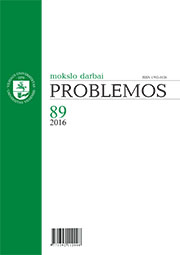PSICHOLOGIZMAS, RELIATYVIZMAS IR SAVĘS PANEIGIMAS HUSSERLIO PROLEGOMENUOSE
PSYCHOLOGISM, RELATIVISM AND SELF-REFUTATION IN HUSSERL’S PROLEGOMENA
Author(s): Paulius RimkevičiusSubject(s): Psychology, Logic, Phenomenology
Published by: Vilniaus Universiteto Leidykla
Keywords: Husserl; psychologism; relativism; psychology; logic;
Summary/Abstract: Psychologism is the identification of the meanings of logical and psychological terms. Husserl’s Prolegomena is the most important anti-psychologistic text. What exactly has been proved in it has been up until now an open question. The aim of this paper is to answer it. The thesis of this article is that in the Prolegomena Husserl has proved that if relativism is false, then psychologism is false, but he has not proved the falsity of relativism or psychologism, because he has not proved that relativism is self-refuting. Firstly, two arguments are analysed that ar sometimes still attributed to Husserl: the one relying on the premise that logic is normative, and the one relying on the premise that logic grounds psychology. It is claimed that they are incompatible with the concept of logic in the Prolegomena. Secondly, Husserl’s own arguments are analysed and it is shown how the conclusion follows from all of them that if relativism is false, then psychologism is false. Finally, the argument is analysed that relativism is self-refuting in one way or another: either in itself, or when it is expressed, or when it is argued for. It is claimed that it does not prove that relativism is false. The conclusions are significant for any view that relativises logic.
Journal: Problemos
- Issue Year: 2016
- Issue No: 89
- Page Range: 153-166
- Page Count: 14
- Language: Lithuanian

